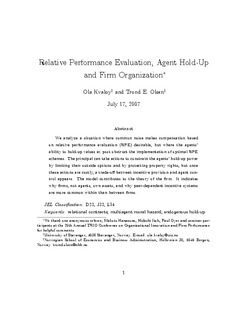Relative performance evaluation, agent hold-up and firm organization
Working paper

Åpne
Permanent lenke
http://hdl.handle.net/11250/163917Utgivelsesdato
2007-07Metadata
Vis full innførselSamlinger
- Discussion papers (FOR) [566]
Sammendrag
We analyze a situation where common noise makes compensation based on relative performance evaluation (RPE) desirable, but where the agents' ability to hold-up values ex post obstruct the implementation of optimal RPE schemes. The principal can take actions to constrain the agents' hold-up power by limiting their outside options and by protecting property rights, but once these actions are costly, a trade-off between incentive provision and agent control appears. The model contributes to the theory of the firm. It indicates why firms, not agents, own assets, and why peer-dependent incentive systems are more common within than between firms.
Utgiver
Norwegian School of Economics and Business Administration. Department of Finance and Management ScienceSerie
Discussion paper2007:26